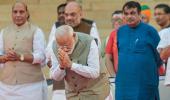'And so, despite demonetisation, people in business feel safe with Mr Modi,' points out T N Ninan.
Illustration: Uttam Ghosh/Rediff.com

The elections are over, and it is time to assess the interpretations of the outcome.
The message from the voter is said to be anti-elitist; an expression of hope by the aspiring; endorsement by beneficiaries of the Modi government's programmes; and a victory of the culturally rooted over the deracinated.
It may be all that and more, but in the story-line of seminal change it is instructive to see whom the victors are targeting -- and whom they are not.
We have left behind the Left vs Right debate.
The Left has been decimated, and there is no serious market-orientation to take its place.
Rather, those presiding over an under-performing, unequal system intend to mollify losers with more welfarism.
When the newly elected Lok Sabha members's median wealth is about Rs 5 crore/Rs 50 million, and average wealth Rs 20.9 crore/Rs 209 million, the majority of those elected belong to the wealthiest 0.1% of the adult population.
From these plutocrats's perspective, welfarism, combined with mobilisation around religion, encourages palliatives, not structural change.
What about feudalism and dynasties: Naamdaars vs kaamdaars? The rhetoric struck home because of the Narendra Modi vs Rahul Gandhi binary.
But we also have Varun Gandhi, Harsimrat Kaur (assets declared: Rs 40 crore/Rs 400 million), Dushyant Singh (address: City Palace, Dholpur), Rajkumari Diyakumari (address: City Palace, Jaipur) and sundry others who have all been elected as members of the ruling alliance.
On the positive side, the idea of the aspirational kaamdaar extends to business, with the celebration of thousands of start-ups.
The new India believes with Deng that to become rich is glorious.
And so, despite demonetisation, people in business feel safe with Mr Modi.
The naamdaars to be targeted are only political rivals, and safe targets on the fringe like Vijay Mallya and Nirav Modi.
What does this mean? That amidst the narrative of change, what we have is a deeply conservative preservation of the status quo.
Substantive change is reserved for Lutyens Delhi-ites in their new avatar as the Khan Market gang -- a term originally coined for parliamentarians who preferred the upscale market's restaurants to the more basic fare of the Parliament House canteen.
But in using the term, Mr Modi neatly transposed it to mean the post-colonial generation that prospered in, indeed owned, the Nehru-Gandhi era.
An ideologue from the Rashtriya Swayamsevak Sangh then said this 'gang' will be 'discarded' from the media, culture and academia.
We may see no storming of the Bastille, but we do want to invade the India International Centre.
Why is this fading group, hopelessly unprepared for battle, so important? Because it still perpetuates the old idea of India, its syncretism the exemplar of a tolerant ethic in a civilisation that seeks to protect the weak, not celebrate strength.
That narrative has to be uprooted, along with Constitutional ideas borrowed from the European Enlightenment, and colonial arrangements imposed by England-educated barristers, all of it to be replaced with homegrown -- pre-Islamic and naturally pre-colonial -- values that await serious articulation.
The de facto reality of everyday governance has already changed; de jure change must follow and no one must stand in the way.
Under attack, Babar's de-legitimised aulad have retreated into frightened silence, while some among Macaulay's great-grandchildren have become like Rubashov, the jailed commissar of the people in Arthur Koestler's mid-century classic, Darkness at Noon: Ready to 'remove his oppositional attitude and to denounce publicly his errors'.
Not because they might have to face one of the 'agencies' (that is still reserved mostly for the chaps who were up to no good), but for fear of becoming irrelevant.
Living in Delhi without mattering is worse than being in Dante's sixth circle of hell, reserved for heretics.
But if Mr Modi's extraordinary popularity, hard-earned, is to be the pivot for a swing to an Indian version of a strongman system (like Singapore, we already throw people in jail for insulting a leader), with criticism drowned out by abusive trolls, confusion between homegrown myth and scientific fact, an RSS worldview in history books, street-level storm-troopers indulged by the police, and appropriately manned institutions bending to the political wind, we run the danger of throwing out the baby and retaining the bathwater.












 © 2025
© 2025